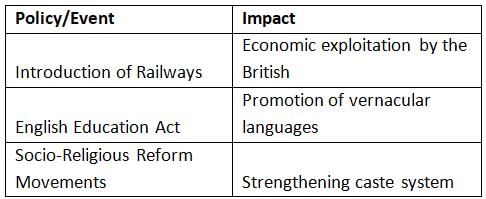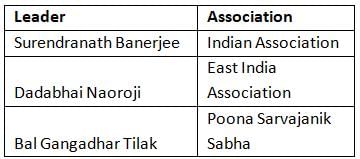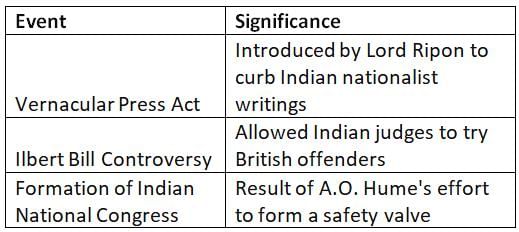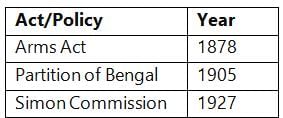Spectrum Test: Beginning of Modern Nationalism in India - Delhi Police Constable MCQ
20 Questions MCQ Test - Spectrum Test: Beginning of Modern Nationalism in India
Consider the following pairs:

How many of the above pairs are correctly matched?

How many of the above pairs are correctly matched?
Consider the following statements:
- The British introduction of modern education in India facilitated the assimilation of Western democratic ideas.
- Rousseau and Voltaire were among the European writers whose works were instrumental in spreading nationalist ideas in India.
- The Vernacular Press Act was introduced by Lord Ripon.
How many of the statements given above are correct?
Assertion (A): The economic policies of the British led to the deindustrialization of the Indian economy.
Reason (R): British policies were designed to make India a supplier of raw materials to Britain and a market for British manufactured goods.
Consider the following statements:
- The Indian National Congress was founded as a direct result of the amalgamation of various political associations in Bengal.
- The introduction of the railways in India by the British was solely for economic exploitation without any political motives.
- The rise of the middle-class intelligentsia was identified by Percival Spear as a dynamic minority with a unified purpose.
How many of the statements given above are correct?
Consider the following pairs:

How many of the above pairs are correctly matched?
Consider the following statements:
- The rediscovery of India's past was significantly influenced by both European and Indian scholars.
- The Indian Renaissance was a movement that rejected modern Western ideas in favor of purely traditional Indian values.
- Socio-religious reform movements in India aimed to address social evils and contributed to the rise of nationalism.
How many of the statements given above are correct?
Consider the following statements:
- Statement-I: The Political Associations before the Indian National Congress demanded administrative reforms and the association of Indians with the administration.
- Statement-II: These associations played a negligible role in the Indian freedom struggle and had no impact on the formation of the Indian National Congress.
Which one of the following is correct in respect of the above statements?
Consider the following pairs:

How many of the above pairs are correctly matched?
Consider the following statements:
- Statement-I: The Indian National Movement was purely a reaction to British economic policies in India.
- Statement-II: Nationalism in India was influenced by a variety of factors including the introduction of Western education, socio-religious reform movements, and the rediscovery of India's past.
Which one of the following is correct in respect of the above statements?
Assertion (A): The All India Muslim League was established in response to the partition of Bengal in 1905.
Reason (R): The partition of Bengal led to widespread political unrest, which necessitated the formation of a separate political platform for Muslims.
Consider the following statements:
- Statement-I: The political associations in India before the formation of the Indian National Congress primarily focused on cultural issues rather than political or administrative reforms.
- Statement-II: The early demands of these associations included administrative reforms, the spread of education, and the association of Indians with the administration.
Which one of the following is correct in respect of the above statements?
Consider the following statements:
- Statement-I: The socio-religious reform movements in India were solely focused on spiritual renewal and had no impact on the nationalist movement.
- Statement-II: These reform movements played a crucial role in removing social evils and contributed to the building of a national identity by promoting a sense of unity among Indians.
Which one of the following is correct in respect of the above statements?
Consider the following statements:
- Statement-I: The British Raj's introduction of modern means of transport and communication was intended to unify the Indian subcontinent culturally and politically.
- Statement-II: The development of modern transport and communication facilitated the economic exploitation of India but also had the unintended consequence of promoting national unity among Indians.
Which one of the following is correct in respect of the above statements?
Consider the following pairs:

How many of the above pairs are correctly matched?
Consider the following statements:
- Statement-I: The rediscovery of India's past by European and Indian scholars played no significant role in the development of Indian nationalism.
- Statement-II: Research by scholars such as Max Mueller and Indian researchers contributed to a new understanding of India's past, bolstering national pride and identity.
Which one of the following is correct in respect of the above statements?
Consider the following statements:
- Statement-I: The impact of contemporary movements worldwide had little influence on the rise of nationalism in India.
- Statement-II: The global upsurge in the concepts of nationalism and self-determination, inspired in part by events like the French Revolution, deeply influenced Indian nationalist thought.
Which one of the following is correct in respect of the above statements?
Consider the following pairs:

How many of the above pairs are correctly matched?
Assertion (A): The establishment of the Indian National Congress in 1885 marked the beginning of an organized national movement in India.
Reason (R): The Indian National Congress was the first political association in India to include members from all over the country.
Assertion (A): The socio-religious reform movements in the 19th and early 20th centuries were crucial in promoting the idea of nationalism among Indians.
Reason (R): These movements were primarily concerned with religious practices and had little interest in political matters.
Assertion (A): The introduction of Western education and the English language had a profound impact on the rise of Indian nationalism.
Reason (R): Western education introduced Indians to Western political thoughts and ideas, which inspired the educated elite to question colonial rule and seek self-government.














